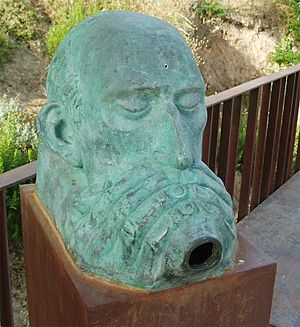José Val del Omar facts for kids
José Val del Omar (born October 27, 1904, in Granada; died August 4, 1982, in Madrid) was a Spanish artist. He was a talented photographer, a creative film director, and an inventor. He loved to experiment with how movies were made and watched.
Who Was José Val del Omar?
José Val del Omar lived during an exciting time in Spain. He was part of special teaching groups called "pedagogical missions." These groups traveled around Spain to bring education and culture to people. He worked alongside famous writers like Federico García Lorca. This period was known as the Silver Age of Spanish culture. It was a time when many new ideas in art and science appeared.
His Unique Vision for Film
Val del Omar called himself a "film believer." For him, movies were more than just pictures on a screen. He had a special idea for film called "PLAT." This stood for Picto-Luminic-Audio-Tactile. It meant he wanted films to involve pictures, light, sound, and even touch! He believed movies should be an experience for all your senses.
As early as 1928, he started trying out his unique film ideas. One idea was the "a-panoramic overflow of the image." This is when a subject in the film seems to move beyond the edges of the screen. Another idea was "tactile vision." This made viewers feel like they could almost touch what they saw.
He used these special techniques in his main work, the "Elementary Triptych of Spain." A triptych is a set of three artworks. His film triptych included:
- Aguaespejo Granadino (1953-1955)
- Fuego en Castilla (1958-1960)
- Acariño Galaico (1961/1981–1982/1995)
The last film was finished after he passed away. Val del Omar's ideas were very new for his time. People didn't fully appreciate his work until after his death.
Films by Val del Omar
Here is a list of films José Val del Omar worked on:
- Estampas (with other "misionaries", 1932, 13 minutes, black and white, silent, 16 mm).
- Fiestas Cristianas / Fiestas Profanas (1934-1935, 51 minutes, black and white, silent, 16 mm).
- Vibración de Granada (1935, 20 minutes, black and white, silent, 16 mm).
- Película Familiar (1938, 8 minutes, black and white, silent, 16 mm).
- Aguaespejo Granadino (1953–55, 21 minutes, color and black and white, 35 mm).
- Fuego en Castilla (1958–60, 17 minutes, color and black and white, 35 mm).
- Acariño Galaico (1961/1981–82/1995, 23 minutes, black and white, 35 mm).
See also
 In Spanish: José Val del Omar para niños
In Spanish: José Val del Omar para niños


